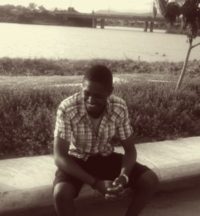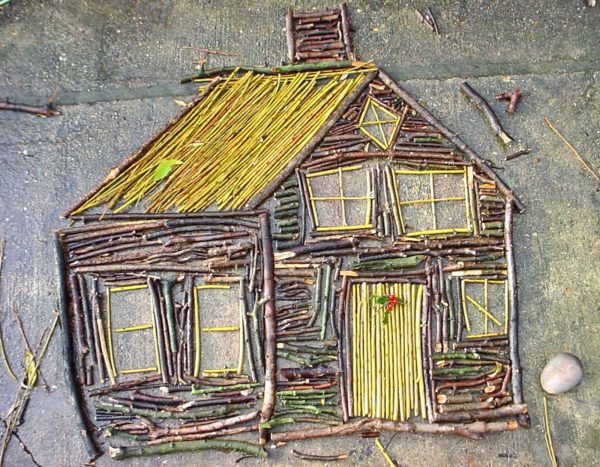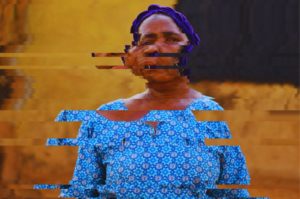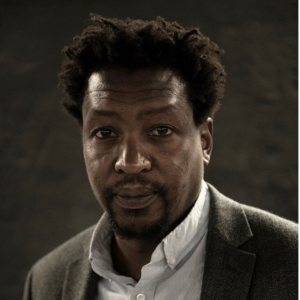I WALK INTO the asylum not expecting to feel anything new. I have been here countless times. Each time, as I made my way through the terrazzo-floored hallway, I tried to avoid the dispirited faces that told grim stories and asked pitiful questions. Questions they slept and woke up with each day, asking, even though they knew would not yield satisfying answers; questions that would only bring the satisfaction of seeing empathy in the eyes of their “listeners.”
The lingering smell of a mixture of fruits and food and disinfectants and antiseptics greet me all at once. I walk and walk, past the couple playing scrabble, moving imaginary tiles and counting; past the elderly man with an uneven beard staring into nothingness; past the young girl with slant eyes and a wild smile that keeps nodding her head and stroking her doll’s hair; past a group of men all seated in a circle with their legs crossed, reading (I wonder what their quarrel with sanity was). There is a woman in white seated in a wheelchair with her head bent to the side. Her eyes are dreamy and she is disturbingly thin. Her lips are dry save for saliva packed in both corners of her mouth. She begins to tap and twitch and tap. She goes on and on and tries to carry a tune with it. Slant eyes with the doll encourage her and join in this tune familiar only to both of them. Excitement is brewing. The woman in the wheelchair begins to shake vigorously and raises her voice to a high pitch. Her singing, which has turned into excited screams, fill the air and all eyes are on her. She is also twitching a lot now. Swiftly, a nurse rushes to her and tries taking her to a room down the hallway. Slant eyes frown at this, hugs her doll frantically as she continues stroking its hair.
I close my eyes and use my hands to cover my ears as the shrieks of the twitchy woman crawl down the hallway until they become faint. I refuse to open my eyes even after she cannot be heard. I am faraway somewhere. You are there with me. We are sitting on a mat. There’s a large grey bag unpacked. There’s more food for me and you than usual. I see grasses, too. The picture becomes clearer. I remember now. I do not have a lot of memory pages to remember from before but this one sticks to me: it was our last time at the park. It was such a long time ago. A stone’s throw from our position, under a large family-sized umbrella, a woman with a funny head and manly arms comfortably sat cross-legged, breastfeeding a toddler. I remember her because you made fun of her eyes when you noticed that, for a while, she had been and still could not stop staring at us for any reason. She really had the muscles of a man.
You leaned forward, stared into my eyes and cupped my cheeks in your hands. I felt your love. Your hands were warm. You looked beautiful with your hair tied high on your head in a neat knot.
“With the passing of time, you’ll find out certain hard decisions life demands you make. It becomes a requirement. You don’t have to be loved by everyone to meet those demands, to make those decisions. Never judge yourself for making them. Never judge anyone too. And things will be better you’ll see. They always turn out better,” you said, trying to be reassuring.
I remember the pleading note in your voice. It was as if you were begging me to not think less of you, to understand why things weren’t the way they used to be. Sick, you said. A word that was meant to explain what it was I saw that took a grip of you those times you were talking and laughing to yourself and then getting lost in your own quiet world. You kissed me on the head and said you loved me and that that was only what truly mattered.
I HEAR my name called and I begin to trail my way behind the nurse through the confusing, same-looking wards as she leads me to you.
Yours is a different realm now; one that leaves me to find relief in fresh tears. You are kneeling down, resting the bulk of your weight on the heels of your foot. You poke your open palm at the beam of sunlight penetrating the blinds of the window. The slice-looking wound on your left wrist looks dried, almost healed. The friendly nurse with a warm smile tells me you have not tried to cut yourself in a while now. Your knuckles are not as red as they used to be. She said your medications are starting to work. This rekindles hope in me. I rest my jaw on the cold, newly painted iron bars. I will myself not to let that first salty liquid glide down my cheek no matter how dingy this picture looks. I call your name. Nothing. You do not see me. You cannot see me. You keep poking at the sunlight. Your face has no expression; not even sadness or a confused smile. I wonder if you still think of me; if you still call my name in the dark. Or maybe I died with your sanity.
BACK home, I start to see you once more as I close my eyes. The park and other distant memories stream back, fresh and clear. I try not to remember you with the scars on your wrist or with your dull eyes or your light-skinned face that has not dressed up with a warm smile in a long time. The only memory I want to see is that of a warm smile plastered all over your face, heartfelt, and sweet life radiating from your bright hazel eyes, unadulterated with pain. Just life. Sweet life.
The nurses say you like to read sometimes and so I decide to write you a letter. I think hard about what to write in my letter. I miss everything about you. I miss your deep, resonant giggle that makes the veins on your neck to bulge when you still laughed. I miss the jokes you told me whenever we were together when we still laughed together. I miss your soft voice. I miss the happy, hopeful aura you always created. I miss everything about you. I cannot be thankful enough for the opportunity you gave to me to know you, to love you.
Remembering now, especially with the bitter presence of reality, you loved me. For this is what love meant to you: that you did not lie to me that everything was fine but you had to leave to get help no matter how torturing the idea seemed. I told myself that, continuously, until I believed it. That was love.
Days pass and my paper still remains plain white. I try to pick out the words carefully in my head; something to show the love in them, something that you will listen to and, perhaps, smile and bat your eyelids from remembrance and familiarity of care and joy and love of what once was. I want to say a lot. I want you to listen with your eyes. I want you to remember. Before your eyes showed you drifting to a place I could not reach.
I try to stop the hot tears that are welling up in my eyes. I fail to. I pick up my pen and swear to write only what I mean. Only what truly matters.
My Dear Mama,
I miss you.
Love
Ali
**************
About the Author:
Post image is by Duncan Holmes via Flickr.
 Jonathan Durunguma was a 2015 semi-finalist for the Awele Creative Trust Award. He lives in Abuja.
Jonathan Durunguma was a 2015 semi-finalist for the Awele Creative Trust Award. He lives in Abuja.










Only What Truly Matters – The Lit June 14, 2019 06:45
[…] Here’s the link to the story: https://brittlepaper.com/2017/01/matters-jonathan-durunguma-african-story/ […]